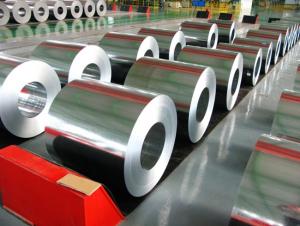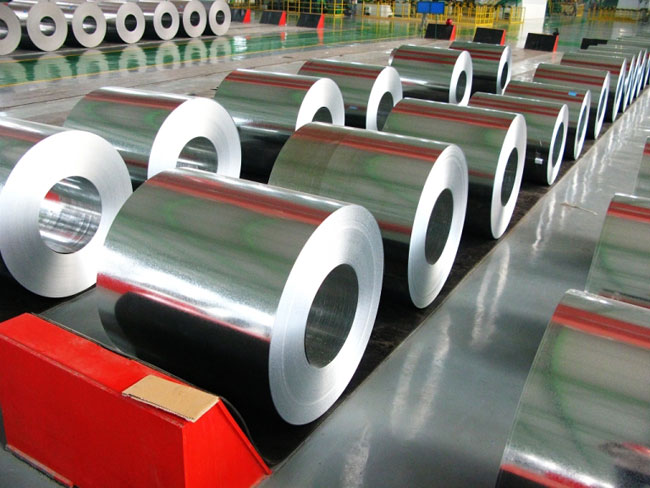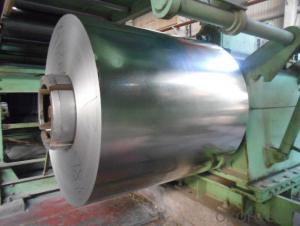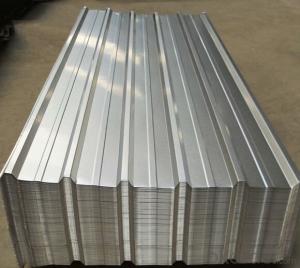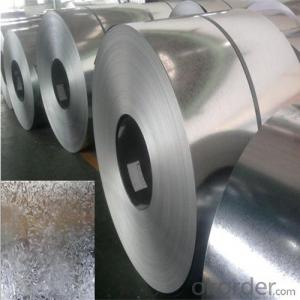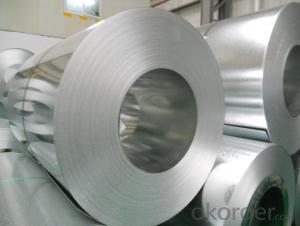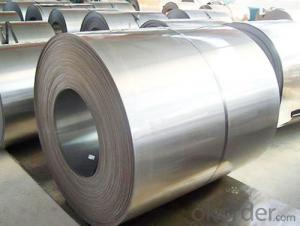HOT-DIP GALVANIZED STEEL
- Loading Port:
- China Main Port
- Payment Terms:
- TT OR LC
- Min Order Qty:
- -
- Supply Capability:
- 12000 m.t./month
OKorder Service Pledge
Quality Product, Order Online Tracking, Timely Delivery
OKorder Financial Service
Credit Rating, Credit Services, Credit Purchasing
You Might Also Like
THICKNESS:0.18mm-1.5mm
WIDTH:900mm-1250mm
COATING MASS:Z30-Z275
SPANGLE:Minimized Spangle,Zero Spangle
SURFACE TREATMENT:N0on or Chromated,Non or Oiled,Non or Anti Finger Print
COIL INNER DIAMETER:508mm/610mm
COIL WEIGHT:3mt-7m
- Q: What are the common applications of stainless steel coils?
- Stainless steel coils have numerous applications in various industries due to their exceptional corrosion resistance, durability, and versatility. Some common applications include manufacturing of kitchen appliances, automotive parts, construction materials, medical instruments, chemical processing equipment, and electrical components. Additionally, stainless steel coils are widely used in the production of pipes, tubes, and fittings for various sectors such as oil and gas, food processing, pharmaceuticals, and water treatment.
- Q: Can steel coils be used in the production of medical equipment?
- Yes, steel coils can be used in the production of medical equipment. Steel is a strong and durable material that can provide structural support and stability to various medical devices and equipment. It is commonly used in the manufacturing of instruments, surgical tools, and machinery used in medical settings.
- Q: What are the different types of steel surface treatments for coils?
- There are several types of steel surface treatments for coils, including hot-dip galvanizing, electro-galvanizing, galvannealing, and organic coating. Hot-dip galvanizing involves immersing the steel coil in a bath of molten zinc to create a protective layer. Electro-galvanizing applies a thin layer of zinc to the surface using an electrical current. Galvannealing is a process that combines galvanizing and annealing to create a zinc-iron alloy layer. Organic coating involves applying a protective layer of paint or other organic material to the steel surface.
- Q: how simple is it to take it scrape steel and recyle it. does annybody know the process . i want to do this but first i need some basic information. as far as i know first to melt the steel and in a furness on high heat and than give the shape that customer wants. how right or wrong am i . i want to start on a very small scale.
- You okorder /... mini-mills operate between 150,000-2million tons of steel per year. If that is the size you were thinking about... you are in business. But since you are asking on Yahoo Answers where no serious industrialist would EVER ask a question like this, I can only assume that your ideas of small are completely incompatible with reality.
- Q: Can steel coils be coated with zinc?
- Yes, steel coils can be coated with zinc through a process called hot-dip galvanization or electroplating. This coating of zinc helps protect the steel from corrosion and rust, extending its lifespan and improving its durability.
- Q: How are steel coils inspected for quality control?
- Steel coils are inspected for quality control through various methods. These methods include visual inspections, dimensional measurements, and non-destructive testing techniques such as ultrasonic testing or magnetic particle inspection. Additionally, the coils are checked for surface defects, such as scratches or corrosion, and are also examined for proper labeling and packaging to ensure they meet the required quality standards.
- Q: What are the typical coil width options?
- The typical coil width options vary depending on the industry and application, but common options range from 1 inch to 72 inches or more.
- Q: How are steel coils used in the manufacturing of automotive chassis?
- Steel coils are used in the manufacturing of automotive chassis as they are shaped and formed into various structural components such as frame rails, cross members, and support beams. These coils are cut, bent, and welded together to create a strong and rigid chassis structure, providing the necessary strength and stability for the vehicle.
- Q: Can steel coils be coated with PVC?
- Yes, steel coils can be coated with PVC. PVC coating provides a protective layer that helps prevent corrosion and enhances the durability of steel coils.
- Q: What are the different methods of protecting steel coils from corrosion?
- Some common methods of protecting steel coils from corrosion include applying a protective coating or paint, using corrosion inhibitors, implementing cathodic protection systems, and storing the coils in a controlled environment with low humidity and proper ventilation.
Send your message to us
HOT-DIP GALVANIZED STEEL
- Loading Port:
- China Main Port
- Payment Terms:
- TT OR LC
- Min Order Qty:
- -
- Supply Capability:
- 12000 m.t./month
OKorder Service Pledge
Quality Product, Order Online Tracking, Timely Delivery
OKorder Financial Service
Credit Rating, Credit Services, Credit Purchasing
Similar products
Hot products
Hot Searches
Related keywords
